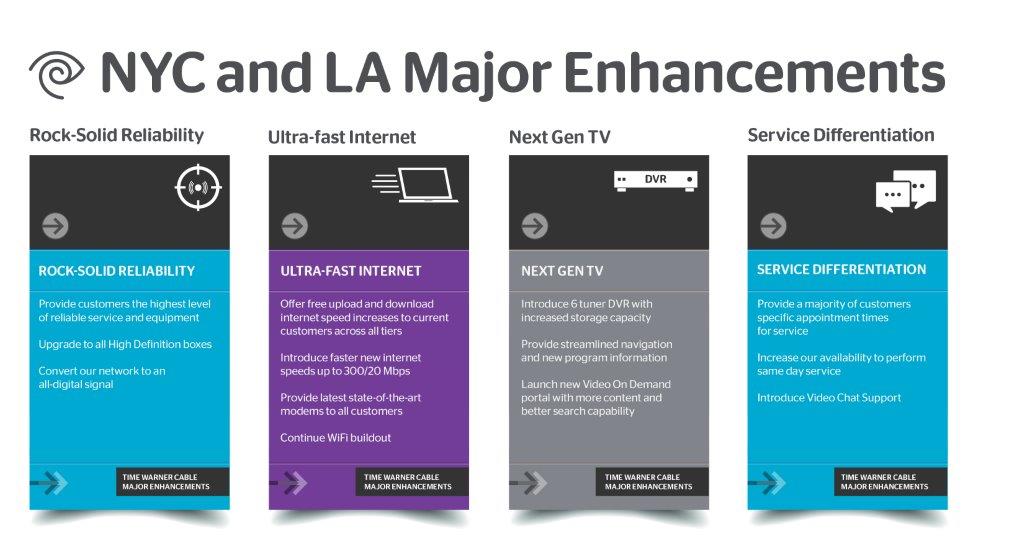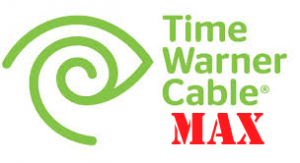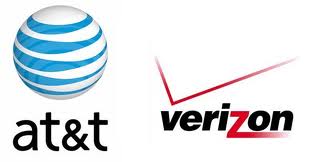Time Warner Cable today announced major improvements in its service, including a tripling of broadband speeds and equipment upgrades that will first arrive in New York City and Los Angeles.
With the cable company facing a hostile takeover effort by Charter Communications with Comcast’s help, CEO Rob Marcus sought to appease shareholders that worry the cable company’s recent lackluster results originate from outdated technology, poor customer service, and broadband speeds that are well below the cable industry average.
Time Warner Cable will have to increase capital spending to pay for the upgrades, expected to cost $3.8 billion annually for the next three years.

CEO Rob Marcus calls the effort a “transformation of the Time Warner Cable customer experience.” The upgrade program is called TWC Maxx for now inside Time Warner Cable, but will have its own brand when it publicly launches later this year.
Here are some highlights:

Marcus
TV Service
- Network infrastructure upgrades to enhance reliability
- New advanced set-top boxes
- A six-tuner DVR
- A cloud-based interface and navigation
- An expanded on-demand library
Internet
- Dramatic free speed boosts for all customers
- A new Ultimate speed tier of 300/20Mbps
Unfortunately, customers outside of Los Angeles and New York will have to wait up to two years for the upgrades to reach their community.

“With ‘TWC Maxx,’ we’re going to essentially reinvent the TWC experience market–by-market,” said Marcus. “We’ll triple Internet speeds for customers with our most popular tiers of service, add more community WiFi, dramatically improve the TV product and, perhaps most importantly, we’ll set a high bar in our industry for differentiated exceptional customer service. We’re focused on providing the features and benefits that matter most to our customers.”
The most noticeable improvement will be free broadband speed upgrades. Customers with Standard or above Internet service will also receive the latest generation cable modems including Advanced Wireless Gateways for customers with Turbo to Ultimate tier service. Marcus did not say whether the company is ending is monthly equipment fees for cable modems.
Here are the new speed tiers:
- Everyday Low Price – Currently 2/1Mbps – New 3/1Mbps
- Basic – Currently 3/1Mbps – New 10/1Mbps
- Standard – Currently 15/1Mbps – New 50/5Mbps
- Turbo – Currently 20/2Mbps – New 100/10Mbps
- Extreme – Currently 30/5Mbps – New 200/20Mbps
- Ultimate – Currently 50/5Mbps – New 300/20Mbps

New York and Los Angeles Upgrade Schedule
The first four network hubs scheduled for upgrade are those in West Hollywood and Costa Mesa, Calif. and portions of Woodside (Queens) and Staten Island, N.Y. The rest of both cities will be upgraded by the end of this year.
Los Angeles customers will also see analog cable television service discontinued in favor of digital later this year. New York City has already been converted to all-digital television. Customers in both cities will be able to schedule same-day appointments and one-hour service windows.
Who Gets Upgraded Next?

Analysts expect Time Warner Cable will upgrade cities where they face competition from U-verse and FiOS after completing NYC and LA.
Analysts say Time Warner Cable’s upgrade plans are more aggressive than initially anticipated and many expect the company to move quickly, especially in competitive markets, to boost subscriber numbers and cut customer defections to help convince shareholders it is worthwhile to reject Charter’s hostile takeover bid.
The most likely markets to be targeted for upgrades after New York and Los Angeles are those facing stiff competition from Google Fiber and Verizon FiOS. Cities where AT&T U-verse delivers competition are likely to come next, and those cities where Time Warner Cable only faces competition from telephone company DSL service will likely be the last to be upgraded. However, long before that, Time Warner Cable could be sold off to other cable operators that will make these upgrade plans moot.
Marcus today reiterated his rejection of Charter’s latest $132.50 a share offer. Marcus said the cable company is only interested in an offer above $160 a share, and that at least $100 of that must be in cash, with the balance in Charter stock. Charter will have trouble delivering that amount of cash without the assistance of other cable operators.
Craig Moffett with MoffettNathanson Research isn’t sure Marcus’ plans are enough to keep TWC from being sold. He expects Charter to soon increase its offer above $140 with the help of Comcast, which is willing to pay cash for Time Warner Cable systems in New York, New England, and North Carolina after a deal with Charter is complete.
[flv]http://www.phillipdampier.com/video/Bloomberg Rob Marcus Interviewed 1-30-14.flv[/flv]
Robert Marcus, chief executive officer of Time Warner Cable Inc., talks about the cable company’s fourth-quarter earnings and its forthcoming upgrades, and Charter Communications Inc.’s $37.4 billion buyout bid. Time Warner Cable beat fourth-quarter profit estimates and forecast subscriber growth. Marcus speaks with Betty Liu on Bloomberg Television. (8:38)


 Subscribe
Subscribe
I’d never thought I’d be rooting for TWC. However, I hope that the company can survive the hostile take over bids! I’ll stick with Time Warner Cable until I am able to subscribe to Google Fiber.
BTW, I wonder if the Motorola SB6141 Modem I bought last August will soon be rendered obsolete?!?
TWC guide interface in NYC didn’t improve. If anything it got worse! Many simple steps simply disappeared, like trying to record a future showing of something I tuned into the middle of or have a time/recording conflict with. LinearTV is dead in the next 5 years. Simply too inflexible in the world of IP.
WOW this would be fantastic…if they survive the takeover. Would probably be next year before the upgrade makes it to western NY but it sounds very nice.
I just have this lingering, sad thought that TWC will never have the opportunity to actually make this happen. They’ve spent way too many years abusing their customer base with unadulterated complacency to save themselves now. They’re in this situation because of their suddenly aggressive application of price increases and tack-on fees, as well as an inexplicable unwillingness to reward loyal customers with decent discounts. They’re bleeding out. But as Milan said… I find myself rooting for them, which is an odd feeling. Comcast and Charter feel like big, scary, looming overlords. @Michael Elling–The 4:3 guide on TWC’s set top… Read more »
Hopefully Austin gets these upgrades sooner rather than later. With GFiber there’ll certainly be the competitive reason for it (WiFi everywhere is great but it’s not reliable in my experience). What’s interesting about these changes is that TWC will be the fastest DOCSIS provider in the US for a little while, based on downstream speeds anyway. I’m sure Comcast will catch up quickly enough, but right now they top out at 105/20 over coax. TWC will undoubtedly need 24×8 modems to deliver this kind of speed (well, they could get away with 16×4 but I think the next thing after… Read more »
As much as I used to dislike having the cable ck.pang throw their weight around in the past, I find myself rooting for Time Warner and the upgrades to Internet connectivity they are starting to push. I am happy that they seem to now realize that having decent Internet connectivity is a must everywhere. Now, assuming these speeds come as cut and dry as the article is making them out to be, then that is huge. No caps, IPv6, and improved network perfornance, with free(?) speed upgrades. Now my question is, since DOCSIS still is not able to touch Fiber… Read more »
As usual looks like Columbus will not get these possible upgrades for several years…yet we are getting charged out the ass for unreliable service.
If this is how they think, let Charter buy them. This is really a bluff to fool the decision-making class: it might help them in negotiations with investors and content companies, but it does nothing to improve the sorry state of internet in second-tier U.S. cities. Improved DOCSIS service might be relevant in Los Angeles, but who needs it in New York City now that Verizon is upgrading copper to FIOS. People think of fiber as a high-end “Cadillac” solution, but it is really the least-cost solution when you are thinking on a time horizon more than 2-3 years. Once… Read more »